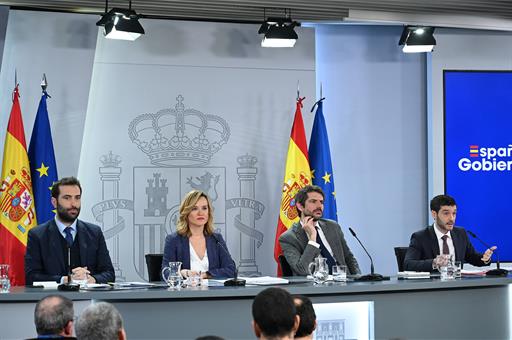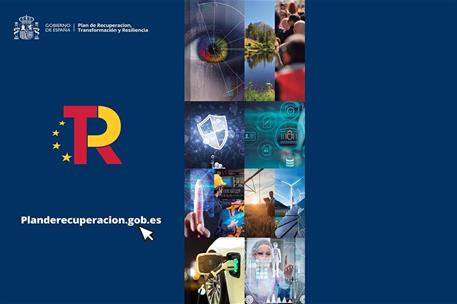Council of Ministers
The Government of Spain raises income thresholds so that scholarships reach more students
Council of Ministers - 2024.2.27
Moncloa Palace, Madrid
The Council of Ministers has established the requirements of the call for scholarships for the academic year 2024-2025. This decision is a step forwards for equal opportunities and aims to prevent students from dropping out of education for socio-economic reasons, according to the Minister for Education, Vocational Training and Sports and Government Spokesperson, Pilar Alegría.
The minister stressed that the call will benefit more than one million students, thanks to a "historic investment" estimated at almost €2.54 billion, 72% more than in 2018.
Improvements in the call for applications for scholarships
Among the new features, Pilar Alegría pointed out that the income thresholds have been raised by 5% to bring them into line with the rise in the CPI and salaries, "so that more families, more children of working men and women can access these grants".
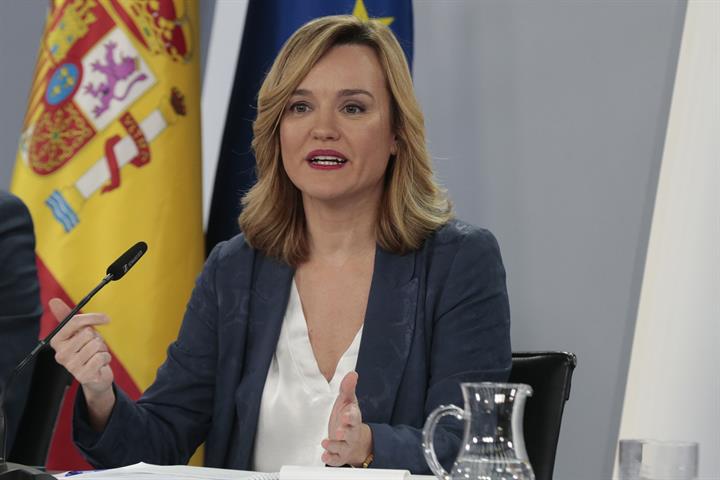 The Minister for Education, Vocational Training and Sports and Government Spokesperson, Pilar Alegría, during her speech at the press conference after the Council of Ministers (Pool Moncloa/José Manuel Álvarez)
The Minister for Education, Vocational Training and Sports and Government Spokesperson, Pilar Alegría, during her speech at the press conference after the Council of Ministers (Pool Moncloa/José Manuel Álvarez)
In addition, the percentage of disability required for students with specific educational support needs to access the grant is reduced from 33% to 25%. To this effect, young people with moderate disabilities will also be able to benefit from the grants.
The 2024-2025 call for applications consolidates two changes introduced in the previous call, The minister pointed out the increase in the amount of the grant for accommodation and residence from €1,600 to €2,500, and the grant of €400 for all students with specific support needs.
€40 billion in Recovery Plan loans
The Council of Ministers has taken the first step towards mobilising up to €40 billion from the Recovery, Transformation and Resilience Plan through the, through the Official Credit Institute (ICO).
These resources will be essential to continue modernising the Spanish economy and to help companies in the double transition they must make in terms of climate change and digitalisation, according to the Minister for Economy, Trade and Enterprise, Carlos Cuerpo. The minister underlined that the loans will make it possible to finance up to 100% of the projects of the self-employed, SMEs and companies of all sizes and in any part of Spain.
Safety net for investments
Carlos Cuerpo recalled that the Recovery Plan has two very distinct phases. The first stage amounts to €70 billion in EU transfers, implementation of which is well advanced. "We are around halfway through the process and around half of the funds have been executed", said the minister, who pointed out that while the funds have increased GDP by an average of 0.4 points in the EU, the increase is 1.9 points in the case of Spain.
The second phase of the Recovery Plan involves €93 billion, most of which - €83 billion - is in the form of loans. This serves a dual purpose: to support companies in a context of higher interest rates that makes financing more difficult, and to promote the continuity of investments with a safety net that will extend beyond 2026. Of the €83 billion in loans, €40 billion will be channelled through five ICO lines that will become available soon.
ICO lines and financial instruments
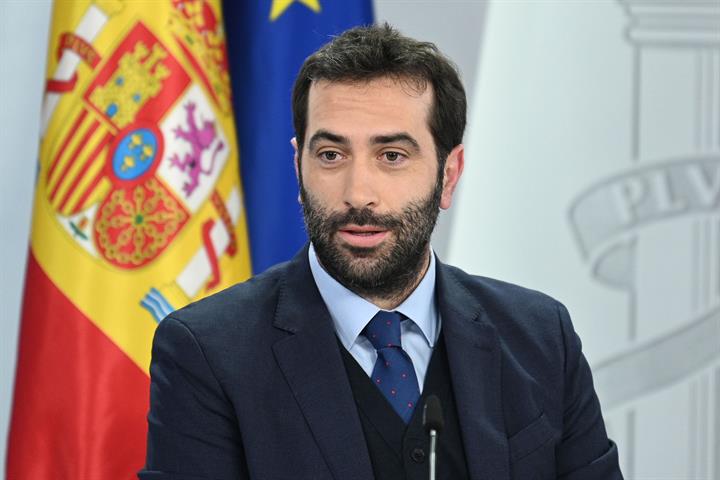 The Minister for Economy, Trade and Enterprise, Carlos Cuerpo, during his speech at the press conference after the Council of Ministers (Pool Moncloa/Borja Puig de la Bellacasa)
The Minister for Economy, Trade and Enterprise, Carlos Cuerpo, during his speech at the press conference after the Council of Ministers (Pool Moncloa/Borja Puig de la Bellacasa)
The line with the largest allocation -€22 billion- will be the ICO-Green, aimed at promoting sustainable transport, energy efficiency and the circular economy.
The ICO-Empresas y Emprendedores line will have €8.15 billion to help companies grow in size and productivity. Carlos Cuerpo indicated that €1 billion will be set aside for tourism: "We are world leaders, but we have to keep working, modernising and making the sector more competitive".
Increasing the stock of social or affordable rental housing is the aim of a third line, endowed with €4 billion and conceived as a complementary element to the actions of the Executive to facilitate access to housing, such as the recent approval of guarantees for the purchase of housing by young people.
Last, more money will be allocated to two pre-existing funds: more than €1.7 billion to the 'Spain Audiovisual Hub', which seeks to boost a key sector from an economic and cultural point of view; and €4 billion to the 'ICO-Next Tech Fund', which promotes innovation in cutting-edge technology companies.
Cuerpo detailed that the loans will be offered through various ICO financial instruments, particularly with the participation of banks. The minister described this public-private collaboration as "one of the fundamental elements of the success of the entire response to the pandemic and of the recovery in recent years". This banking capillarity will enable around half of the €40 billion to be channelled, with advantageous conditions in terms of interest rates, repayment terms and financing percentage. In addition, projects requiring below €10 million will benefit from administrative simplification.
Family and consumer protection
The Council of Ministers has agreed to refer the Family Law and the Customer Service Law back to Parliament, given that their processing was interrupted by the elections.
The Minister for Social Rights, Consumer Affairs and Agenda 2030, Pablo Bustinduy, pointed out that the two legislative initiatives, which were promoted in the last legislature, "materialise the Government's commitment to protecting collective well-being and the democratisation of economic and social life in Spain".
Family Law
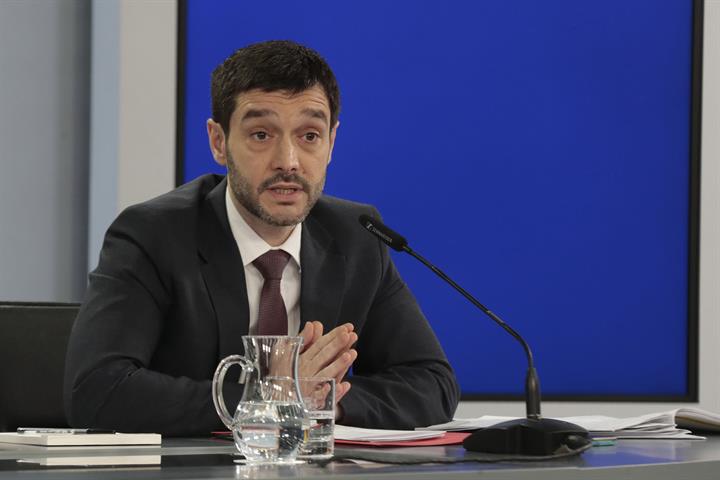 The Minister for Social Rights, Consumer Affairs and Agenda 2030, Pablo Bustinduy, during his speech at the press conference after the Council of Ministers (Pool Moncloa/José Manuel Álvarez)
The Minister for Social Rights, Consumer Affairs and Agenda 2030, Pablo Bustinduy, during his speech at the press conference after the Council of Ministers (Pool Moncloa/José Manuel Álvarez)
Pablo Bustinduy emphasised that the Family Law will be a milestone in social policy, the objectives of which are to guarantee economic and social protection for families, deepen their right to conciliation and advance in the full legal recognition of the different types of families.
The minister pointed out that family and child protection has traditionally suffered from a public investment deficit of approximately one percentage point of GDP in relation to the European average, which was aggravated by the cuts of the last decade. This has resulted in an increased burden on families and especially on women, who usually take on the tasks associated with caring.
The Government considers it a democratic task to ensure that material and time constraints are not a stumbling block for every individual to be able to develop their life plan. The minister explained that "the Family Law tackles this issue by establishing an ambitious and coherent framework of public policies that especially affect the economic and social protection of families, promoting joint responsibility and work-life balance and adapting our legal system to the reality of the family in our country, which the law recognises and protects".
Bustinduy stressed that for the first time the future law recognises the existence and specific needs of the two million single-parent families, 81% of which are headed by a woman. From now on, they will have an official single parent accreditation certificate and will be able to have 16 weeks of free early childhood education within the first 24 months of their child's life. They will have priority access to subsidised housing, social renting, grants, aid, educational centres, public transport and cultural and leisure activities. In addition, the rights of single parents with two children will be brought into line with those of large families.
The regulation also formalises the equalisation of rights, such as pensions and other benefits, between unmarried couples and married couples, through the creation of a state register of unmarried couples.
The head of Social Rights has advanced that the law formalises the existence of a parenting allowance. It also includes the possibility of taking birth leave ten days before the birth for the second parent, and incorporates cases of permanent fostering.
The regulation also extends the threshold for access to the Maintenance Payment Guarantee Fund and its amount, which may reach €500 per month, as opposed to the current €100 per month. Families with four or more children, three in the case of multiple births, will be recognised as special category large families. Families with two children and one parent with a 33% disability will be treated as large families.
Customer Services Act
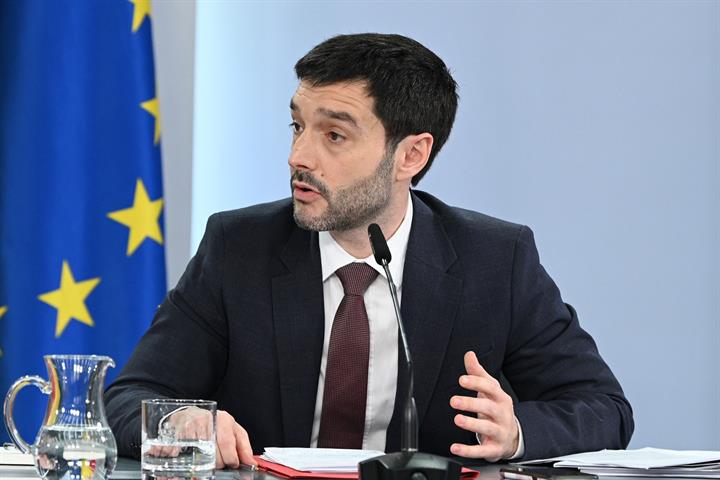 The Minister for Social Rights, Consumer Affairs and Agenda 2030, Pablo Bustinduy, at the press conference after the Council of Ministers (Pool Moncloa/Borja Puig de la Bellacasa)
The Minister for Social Rights, Consumer Affairs and Agenda 2030, Pablo Bustinduy, at the press conference after the Council of Ministers (Pool Moncloa/Borja Puig de la Bellacasa)
The Minister for Social Rights, Consumer Affairs and Agenda 2030 has stated that the Law on Customer Services will extend the rights of consumers in two areas: time and the quality of the service received.
The future law will halve the deadline for resolving citizens' complaints from one month to two weeks. Bustinduy also pointed out that it sets a maximum time limit of three minutes for companies to answer calls from their customers, who can ask to speak to a specialised operator at any time.
The law stipulates that companies must offer personalised benefits to their customers based on considerations such as age and disability. By way of example, the minister explained that the hearing impaired have the right to be attended in an accessible format and the elderly in person in the area of financial services.
In addition to promoting universal accessibility and mitigating the digital divide, the law also provides for customer services to be available 24 hours a day, 365 days a year in basic services such as energy, water, transport, financial services and telecommunications.
The law also includes the right for consumers to be attended to in the state's co-official languages.
Pablo Bustinduy added that to ensure compliance with these requirements, the text obliges companies to undergo external audits.
"The rights of consumers are social rights and democratising consumer relations, alleviating the inequalities that often affect them and guaranteeing respect and fairness in these relations for all citizens is and must be one of the main commitments of the public authorities", the minister remarked.
Spanish Copyright and Related Rights Office
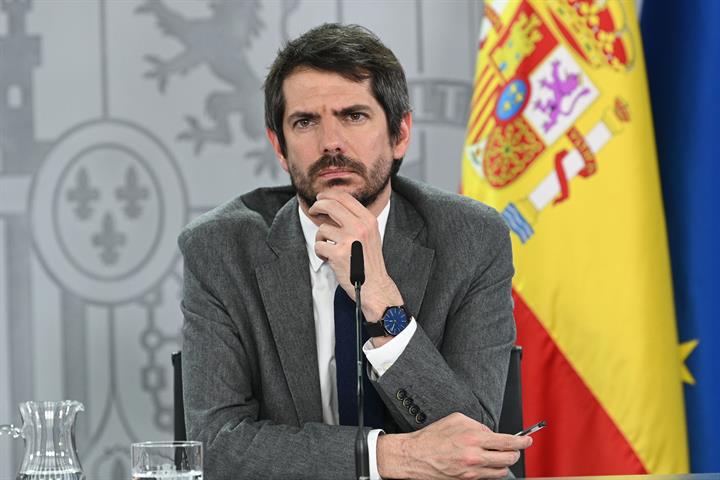 The Minister for Culture, Ernest Urtasun, at the press conference after the Council of Ministers (Pool Moncloa/Borja Puig de la Bellacasa)
The Minister for Culture, Ernest Urtasun, at the press conference after the Council of Ministers (Pool Moncloa/Borja Puig de la Bellacasa)
The Council of Ministers has approved the referral to the Spanish Parliament for urgent procedure of the draft law creating the Spanish Copyright and Related Rights Office (Oficina Española de Derechos de Autor y Conexos, with the aim of bringing it into force as soon as possible.
The Minister for Culture, Ernest Urtasun, stressed that intellectual property is the main asset of the cultural and creative industries, which represent around 3.2% of Spain's GDP. In his opinion, the future law will be a very important step forward in the defence of copyright in the new digital and artificial intelligence-led world.
Urtasun affirmed that this autonomous body will offer a better and more agile public service. Copyright law, he argued, is shaped by the negotiations that take place at European and international levels, and this body is necessary to be represented and to defend the sector's interests. It will also provide greater oversight and control of IPR collecting societies and independent collecting societies themselves.
The office will be responsible for registration, defence and enforcement of intellectual property rights, dispute resolution, arbitration and combating piracy.
Furthermore, with the creation of the office, the Government will have a new tool to protect Spanish creators from artificial intelligence. One of the concerns of creators, the minister pointed out, is that generative artificial intelligence will use works and creations without respecting copyright and intellectual property.
"Today we are taking an important step forward in providing our country with a strong body to continue defending copyright and intellectual property, which is a very important sector, not only economically but also culturally in our country," he concluded.
Speeding up formalities and free Renfe services for the victims of the fire in Valencia
At the beginning of the press conference, Pilar Alegría expressed the Executive's condolences for the fire in the Campanar neighbourhood of Valencia. The spokeswoman thanked all the public servants for their work, as well as the doorman of the block of flats, whose quick action facilitated the evacuation of many residents. She also highlighted the collaboration and coordination with the City Council and the regional government, and the mobilisation "from the first second" of troops and material resources.
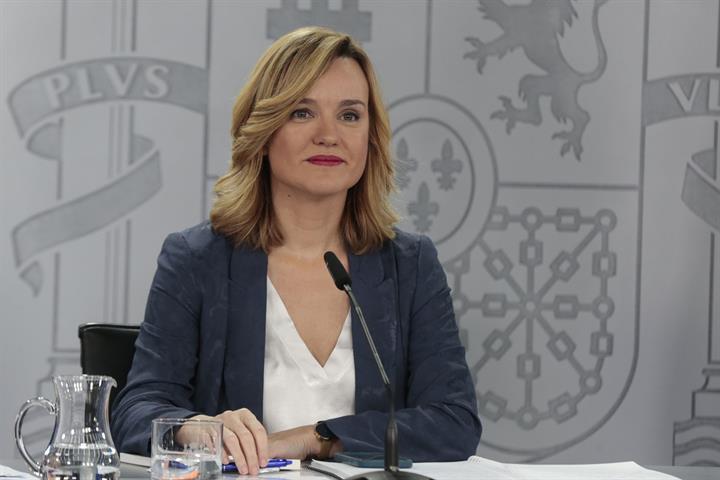 The Minister for Education, Vocational Training and Sports and Government Spokesperson, Pilar Alegría, at the press conference after the Council of Ministers (Pool Moncloa/José Manuel Álvarez)
The Minister for Education, Vocational Training and Sports and Government Spokesperson, Pilar Alegría, at the press conference after the Council of Ministers (Pool Moncloa/José Manuel Álvarez)
The Executive today adopted additional measures "to help the difficult return to normality of the citizens who have seen their homes and dwellings destroyed by the flames of the fire," Alegría said. In particular, it has speeded up all the procedures that depend on the General State Administration, such as the issuing of identity cards and driving licences and the certification of properties. Furthermore, in collaboration with Valencia City Council, a one-stop shop has been set up so that all those affected by the fire can use Renfe services free of charge.
Non official translation





